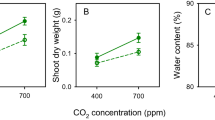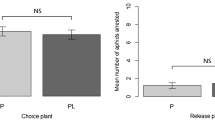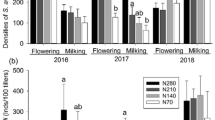Abstract
MANY tree dwelling aphids such as the sycamore aphid, Drepanosiphum platanoides (Schrk.), feed on the phloem sap of leaves and are restricted to one host plant. If therefore the aphids affect the metabolism of the leaves of deciduous trees while they are still developing in the spring, this may subsequently affect later generations of aphids.
This is a preview of subscription content, access via your institution
Access options
Subscribe to this journal
Receive 51 print issues and online access
$199.00 per year
only $3.90 per issue
Buy this article
- Purchase on Springer Link
- Instant access to full article PDF
Prices may be subject to local taxes which are calculated during checkout
Similar content being viewed by others
References
Dixon, A. F. G., Animal Populations in Relation to their Food Resources, 271 (Blackwell, Oxford, 1970).
Dixon, A. F. G., J. Appl. Ecol., 7 (1970) (in the press).
Author information
Authors and Affiliations
Rights and permissions
About this article
Cite this article
DIXON, A. Stabilization of Aphid Populations by an Aphid Induced Plant Factor. Nature 227, 1368–1369 (1970). https://doi.org/10.1038/2271368a0
Received:
Issue Date:
DOI: https://doi.org/10.1038/2271368a0
This article is cited by
-
Biochemical changes in the Brassica juncea-fruticulosa introgression lines after Lipaphis erysimi (Kaltenbach) infestation
Phytoparasitica (2018)
-
Mechanisms and evolution of plant resistance to aphids
Nature Plants (2016)
-
10.1007/BF00335098
CrossRef Listing of Deleted DOIs (2011)
-
Ant‐ and plant‐mediated indirect effects induced by aphid colonization on herbivorous insects on tall goldenrod
Population Ecology (2008)
-
The population dynamics of the large pine aphid, Cinara pinea (Mordv.)
Population Ecology (1990)
Comments
By submitting a comment you agree to abide by our Terms and Community Guidelines. If you find something abusive or that does not comply with our terms or guidelines please flag it as inappropriate.



